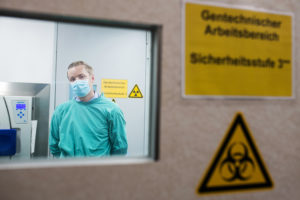A large number of viruses make life difficult for humans and animals. While broadly effective drugs are used in the fight against different bacteria, there have been no substances analogous to broad-spectrum antibiotics that are active against a large number of viruses. An international research team has now succeeded in chemically optimising the polymer polystyrene sulfonate (PSS) in such a way that it could be effectively used for antiviral prophylaxis and the treatment of viral infections – against SARS-CoV-2 and HIV-1, as well as against Zika, herpes and cold viruses. The study, led by the Universities of Ulm and Aarhus, was published in the renowned journal Advanced Science.
The best way to prevent viruses from multiplying and spreading is to prevent them from entering the cell. But effective entry inhibitors that keep different virus families and species in check are still a long time coming. No such agent is yet clinically available. A research project of the University Hospital Ulm and Aarhus University in Denmark now promises hope. “We have developed a negatively charged polymer that can prevent viruses from entering cells. We suspect that the polymer wraps itself around viral envelope proteins and interferes with the interaction with the cell’s receptor proteins through its charge,” explains the study’s first author Rüdiger Groß, a doctoral student at the Institute of Molecular Virology at Ulm University Hospital and first author of the study published in Advanced Science.
The Ulm researchers were already able to show in earlier studies that polystyrene sulfonate (PSS) – the chemical name of this polymer – is an effective antiviral entry inhibitor. “Now we have investigated different chemical optimisation strategies and evaluated to what extent they improve the broad efficacy of the polymer,” says Professor Jan Münch, co-head of the Ulm Institute of Molecular Virology. The Ulm researcher coordinated the study together with his Danish colleague Professor Alexander N. Zelikin from Aarhus University. Together with his team, the scientist from the Department of Chemistry and the Interdisciplinary Nanoscience Centre was responsible for the synthetic chemistry in the project. “With longer polymer chains and coupling to gold nanoparticles, we succeeded in further increasing the effectiveness against most viruses,” says Zelikin.
With cell culture experiments, the researchers were able to show that the chemically optimised PSS is antivirally effective against SARS-CoV-2; and this also applies to the omicron variant. Inhibitory effects against HIV-1, herpes simplex virus-1, the Zika virus and the respiratory syncytial virus RSV as well as against the cold coronaviruses OC43 and NL63 were also demonstrated. The scientists then tested the tolerability of the active substance in mice. They found that PSS is very well tolerated when it is administered intranasally – for example, via a nasal spray. Using corresponding mouse models, it was also possible to demonstrate that treatment with PSS attenuates infection with SARS-CoV-2 and RSV.
“With our study, we were able to demonstrate that chemically optimised polymers based on polystyrene sulfonate are promising candidates for the development of broadly effective antiviral entry inhibitors,” the researchers said. The team is currently working on investigating the local application of PSS – for example as a spray or nebuliser – for the treatment or prevention of respiratory viral diseases in further models. The research project was funded by the European Research Council (ERC) through the Fight-nCoV programme. In addition to the Universities of Ulm and Aarhus, research institutions from Leipzig, as well as from Brazil, Sweden and France were involved in the study.
Publication credits:
Rüdiger Groß, Lívia Mesquita Dias Loiola, Leila Issmail, Nadja Uhlig, Valentina Eberlein, Carina Conzelmann, Lia Raluca Olari, Lena Rauch, Jan Lawrenz, Tatjana Weil, Janis A Müller, Mateus Borba Cardoso, Andrea Gilg, Olivia Larsson, Urban Höglund, Sandra
Axberg Pålsson, Anna Selch Tvilum, Kaja Borup Løvschall, Maria M. Kristensen, Anna-Lena Spetz, Fortune Hontonnou, Marie Galloux, Thomas Grunwald, Alexander N. Zelikin*& Jan Münch*, Macromolecular viral entry inhibitors as broad-spectrum first-line antivirals with activity against SARS-CoV-2, in Advanced Science, 11 May 2022, doi: 10.1002/advs.202201378

